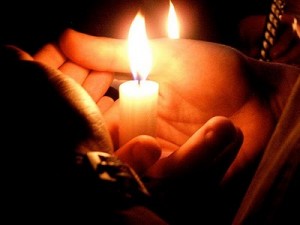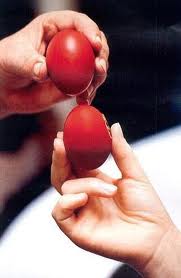 Do you know what you’re doing for this weekend’s Easter celebration? In the U.S., even many families who are not religious observe the holiday. It can be a good time to bring families together and celebrate life by reflecting on the death and rebirth that is the religious focus of the holiday for many. If you are searching for ideas for a get-together for your family, consider these, from the Greek Orthodox tradition.
Do you know what you’re doing for this weekend’s Easter celebration? In the U.S., even many families who are not religious observe the holiday. It can be a good time to bring families together and celebrate life by reflecting on the death and rebirth that is the religious focus of the holiday for many. If you are searching for ideas for a get-together for your family, consider these, from the Greek Orthodox tradition.
Easter holiday customs are some of the most traditional and most sacred observances in modern Greek life. The festivities last throughout Holy Week, which begins Palm Sunday (the week before Easter) and run through Easter Monday.
Holy Thursday
Today is the day to begin preparations for the traditional Easter dinner, baking the bread tsoureki, and dying eggs.
Rather than the pastel colors common in U.S. culture, Greeks dye their Easter eggs red, which is the color of life as well as a representation of the blood of Christ. With the eggs symbolizing the renewal of life, the message of the red eggs is victory over death.
On Holy Thursday evening, there is a church service with a symbolic representation of the crucifixion to begin a period of mourning. In many communities, women will mourn throughout the night in the church.
How can you celebrate?
Borrow the Greek Orthodox tradition of painting your Easter eggs red, with these beautiful and elaborate designs, in honor of the renewal of life. Prepare for a feast with your family or friends – maybe even try out the tsoureki recipe!
Great Friday
This is the holiest day of Holy Week. The day is devoted to mourning, and no work (including cooking) is done. Women and children will take flowers to the church to decorate the bier of Christ, which is carried in a procession through the community to the cemetery and back during the Service of Lamentation.
How can you celebrate?
Take this day to rest and reflect on the lives of loved ones you’ve lost over the years. This can be a time of mourning and remembrance for your family and loved ones.
Holy Saturday
On this day, the Eternal Flame is brought to Greece by military jet and carried by Priests to their local churches, an event that is televised for the entire country to watch.
At home, families begin preparations for the feast to follow the next day. Traditional dishes like the mayiritsa soup are prepared
At midnight, churches are packed to the gills for the Service of the Resurrection, the patrons holding traditional white candles called “labatha,” often lavishly decorated. Often these candles are decorated with the favorite storybook characters of children and given to them as gifts. Once the clock passes midnight, the lights go out and the Priest passes the Eternal Flame from person to person until the church is lit by the candles each person holds. The Priest calls out “Christos Anesti” (Christ is risen) at the stroke of midnight, church bells ring, ships in Greek ports sound their horns, floodlights are lit in cities, and fireworks are set off in celebration.
 To break the day’s fast, the mayiritsa soup, tsoureki, and eggs are eaten when families arrive home after the midnight service. Before the eggs are eaten, they play a friendly game called tsougrisma, attempting to crack the eggs of an opponent by tapping it with your own egg.
To break the day’s fast, the mayiritsa soup, tsoureki, and eggs are eaten when families arrive home after the midnight service. Before the eggs are eaten, they play a friendly game called tsougrisma, attempting to crack the eggs of an opponent by tapping it with your own egg.
How can you celebrate?
Even without attending a midnight church service, you can observe some of these traditions and enjoy the celebration of life that is felt in the Greek Orthodox church at the stroke of midnight. Prepare the traditional soup and bread, and enjoy a feast with family or friends. Try your hand at tsougrisma to see if you can beat your opponents!
Easter Sunday
Grills are fired up by dawn on Easter Sunday to cook the traditional whole roasted lamb, a representation of the Lamb of God. (Many also cook a simple oven or stovetop lamb or goat dishes. Elaborate feasts are prepared, complete with Greek wines, ouzo, and other drinks.
How can you celebrate?
Try some of these traditional Greek recipes for your own Easter feast.
Easter Monday
This is a national holiday in Greece, a day off of work, meant to slow down and recoup from the previous days’ festivities – and enjoy tons of tasty leftovers!

 Easter in the Greek Orthodox Tradition
Easter in the Greek Orthodox Tradition



 John Mulaney’s “Funeral Planning” on Netflix: No Real Plan
John Mulaney’s “Funeral Planning” on Netflix: No Real Plan

 Composting Bodies Is Now Legal in a Dozen States
Composting Bodies Is Now Legal in a Dozen States














